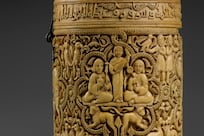[ UPDATE - Nicolas Anelka's double guides Chelsea to first leg win in Copenhagen ]
In a sense, a Dane from Greenland is responsible for all this.
The £750 million (Dh4.425 billion) spent on one west London football club, the taciturn, quixotic Russian owner, his three Premier League titles, those seasons of near-things in the Champions League, the transfer and wage inflation that has changed the face of the English game. One upright Dane skidding the ball past Jerzy Dudek on the final day of the 2002/03 season started it all.
With Jesper Gronkjaer's winner against Liverpool came a Champions League place that staved off financial disaster at Chelsea. A month later, Roman Abramovich had bought the club, the investment secured by a direct entry into the competition he believed his prodigious wealth would soon also make his own.
Gronkjaer, the skittishly effective attacker, was to be a billionaire's employee for just one season. Edged towards the sidelines by the purchases of Joe Cole, Damien Duff and Arjen Robben, he initially departed for Birmingham City.
Rapidly moving on to Atletico Madrid and Stuttgart, by the summer of 2006 he was back in Denmark with Copenhagen - the club that will examine Chelsea's questionable health in Champions League competition on Tuesday evening.
The visitors might fear their former teammate's ability to choose his moments.
"If history is correct, that goal is said to have been enormously important," Gronkjaer said.
"We broke a long period in which Chelsea had not been in the Champions League. To score was a tremendous joy, partly because I did not get very many goals.
"Afterwards, there was a great atmosphere in the dressing room because now we were to play Champions League. It was among the most important matches I've played, though at the time we knew nothing about Abramovich."
That state of blissful ignorance was not to last for long. The £60m spent on Chelsea's shares was just the beginning, then followed the most spectacular outlay on players English football had ever seen.
"The summer was crazy," Gronkjaer said. "There were eight to 10 new players, and the same number left. I remember we were on a 12-day training camp in Malaysia. One day, Wayne Bridge arrived, a couple of days later Damien Duff showed up, while a third player went home. We were all thinking 'Are we going to have a squad of 30 players?'
"There was also questions about Claudio Ranieri from the day Abramovich arrived. Although we won matches and were top of the league, there was tremendous pressure on the coach.
"Abramovich sat in the dressing room sometimes and other times he stood on the sidelines. He could not speak English but was always surrounded by a crowd. There was a lot of mystery around him.
"The day before we played the Champions League match in Rome [a 4-0 defeat of Lazio], he stood out on the running track and watched. I cannot say whether he actually has any football savvy, but his presence meant that there was consistently a strong push to achieve and a lot of speculation."
Gronkjaer, who was born in Nuuk, the capital of Greenland, an autonomous country under the Kingdom of Denmark, had been at Chelsea since 2000, one of Ranieri's first acquisitions at a significant, £7.5m fee from Ajax. Arriving injured and fitful of form, he did not manage a 30-game season until his third year there.
He was amused by the paradoxes of a "huge club" that "trained on an old windblown pitch 250 metres from where Concorde aeroplanes took off from.
"Every day at 10.45am we had to make a break in the training, because we could hear nothing." Gronkjaer's exit from London coincided with a difficult period in which his mother died and he struggled to settle at three separate clubs. His four years at Copenhagen, however, have brought three League titles and a Danish Player of the Year award.
At 33, he remains central to the team's creativity operating on the wing or as a shadow striker and is as canny in his predictions for the Chelsea tie as in his play.
"If everything works for them and their players are in top form, they are scary to have to deal with," said Gronkjaer, whose team have been on a long winter break.
"But we must be close to the level we were at in the autumn, otherwise we've no chance.
"Nil-nil would be a brilliant result to take over there."
Asked which of his colleagues are most likely to follow his own path to the Premier League, Gronkjaer picked out the manager, Stale Solbakken.
Briefly a midfielder for Wimbledon in the late 1990s, Solbakken's playing career was ended by a heart attack in training, precipitating a coaching career of almost continuous success.
"Stale must be a hot name in Europe and I am sure he'll end up in one of the biggest clubs," Gronkjaer said of a coach who held Barcelona to a draw in the group stages, comfortably qualifying ahead of prodigiously financed Rubin Kazan and Panathinaikos.
"Stale is honest. Towards himself and towards the players. Where other coaches think too much about the reactions he'll get from the discarded player and outsider, Stale is consistent," said Gronkjaer.
Consistency. It's a trait Gronkjaer's former employer has always struggled with.





